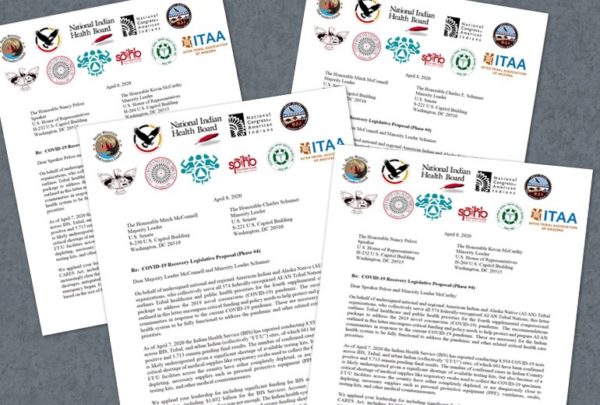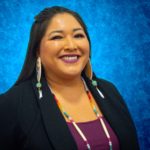
- Details
- By Native News Online Staff
WASHINGTON, DC — After witnessing a series of funding and process hiccups in the first three COVID-19 relief packages, leaders from the National Indian Health Board (NIHB) and 10 other Tribal advocacy organizations have reached out to Congressional leaders to ensure Tribes are “meaningfully included” in the fourth relief package.
The groups sent a letter late Wednesday night to House and Senate leaders, outlining “a robust and comprehensive” list of Tribal health priorities. The priorities include $8 billion of funding for the Indian Health Service as well as legislation to help maximize third-party health care revenues and to ensure Indian Country has direct access to the Strategic National Stockpile.
The outreach to Congressional leaders comes as part of a coordinated effort by national and regional Native advocacy groups to ensure funding for Indian Country. That includes addressing procedural issues and cutting red tape that made accessing prior COVID-19 aid grants an inordinately slow and difficult process to navigate.
“Tribal leaders and Tribal health directors were instrumental in identifying Tribal and public health priorities and we urge Congress to include them in phase four funding that will address critical, Tribal needs around COVID-19,” NIHB Chairperson Victoria Kitcheyan said in a statement. “Indian Country had significant wins in the CARES Act, but our systems operate on such limited resources, that the Indian health system needs more support to effectively respond to COVID-19.”
The letter to Congressional leaders notes: "We applaud your leadership for including significant funding for IHS and tribal sites under the CARES Act ... however, it has become increasingly clear that this funding was not enough. The Indian health system had pervasive provider shortages, antiquated healthcare infrastructure, and severe funding shortfalls before the COVID-19 emergency began."
Space capacity at IHS facilities is only half of what's needed based on the American Indian and Alaska Native (AI/AN) population, the letter notes. As well, there are only a reported 33 intensive care unit (ICU) beds across Indian Country, and the average IHS hospital is four times older than mainstream hospitals.
"The Indian health system was woefully unprepared to address this pandemic to begin with ... and is likely to buckle in the absence of significant financial investment in the phase 4 COVID-19 response package," the letter notes.
The Tribal and public health priorities requested of Congress are broken into four sections: funding, technical Medicaid and Medicare fixes, technical amendments, and legislative fixes and re-authorizations. Notable priorities include:
- $1.215 billion for hospitals and health clinics
- Establish a $1.7 billion Emergency Third-Party Reimbursement Relief fund for IHS, Tribes, Tribal organizations and urban Indian organizations
- $85 million for equipment purchases and replacements
- Maximize third party-reimbursements by making technical fixes to Medicare and Medicaid
- Expand telehealth capacity and access in Indian Country by permanently extending waivers under Medicare
- Provide direct IHS, Tribal and urban Indian organization access to the Strategic National Stockpile
- Permanently reauthorize the Special Diabetes Program for Indians
The organizations’ request for $1 billion to pay for Purchased/Referred Care (PRC) will ensure Indian Health Service (IHS) and Tribal facilities have the resources needed to pay for outside specialty care related to COVID-19. PRC, also known as contract health, is a program that allows IHS and Tribally operated facilities to contract out essential health care services that are not available within the Indian health care delivery system. Because of Coronavirus, IHS and Tribal facilities are having to refer patients to outside providers for high cost emergency and specialty care which is quickly depleting Purchased/Referred Care resources.
 NIHB Chairwoman Victoria Kitcheyan is also a Tribal Councilwoman with the Winnebago Tribe of Nebraska (Courtesy Photo)
NIHB Chairwoman Victoria Kitcheyan is also a Tribal Councilwoman with the Winnebago Tribe of Nebraska (Courtesy Photo)
“With more and more positive COVID-19 cases increasing in our Tribal communities, the need for specialty care increases too. Purchase and referred care dollars are already scarce even without a pandemic,” Kitcheyan said. “A lack of sufficient funding for PRC forces IHS and Tribal facilities to ration health care at a time when our people’s lives are at stake. We should never have to pick and choose who gets health care.”
Joining NIHB, the letter was signed by the National Congress of American Indians , Self-Governance Communication and Education Tribal Consortium , Alaska Native Health Board , Rocky Mountain Tribal Leaders’ Council , California Rural Indian Health Board , Great Plains Tribal Chairmen’s Health Board , United South and Eastern Tribes Sovereignty Protection Fund , Inter-Tribal Association of Arizona and Northwest Portland Area Indian Health Board.
In addition to advocacy efforts, NIHB continues to work with federal agencies that are administering the funding from the first three COVID-19 funding packages to Tribes by hosting listening sessions and consultations for Tribal leaders to engage in dialogue on how the funding should get to the Tribes.
“Tribal consultation is imperative right now and it’s incredibly important for federal agencies to follow their own Tribal consultation policies. Tribes know best on how to take care of their people and where best to allocate these funds. The federal agencies need to trust the Tribes to lead and protect their own people,” said Kitcheyan.
Visit the NIHB COVID-19 Tribal Resource Center: www.nihb.org/covid-19.
More Stories Like This
Native News Weekly (August 25, 2024): D.C. BriefsNavajo Nation Mourns the Passing of Former Vice President Rex Lee Jim
Deb Haaland Earns Endorsement From Communications Workers of America Local 7076
University Soccer Standout Leads by Example
Two Native Americans Named to Democratic Congressional Campaign Committee's“Red to Blue” Program
Help us defend tribal sovereignty.
At Native News Online, our mission is rooted in telling the stories that strengthen sovereignty and uplift Indigenous voices — not just at year’s end, but every single day.
Because of your generosity last year, we were able to keep our reporters on the ground in tribal communities, at national gatherings and in the halls of Congress — covering the issues that matter most to Indian Country: sovereignty, culture, education, health and economic opportunity.
That support sustained us through a tough year in 2025. Now, as we look to the year ahead, we need your help right now to ensure warrior journalism remains strong — reporting that defends tribal sovereignty, amplifies Native truth, and holds power accountable.
 The stakes couldn't be higher. Your support keeps Native voices heard, Native stories told and Native sovereignty defended.
The stakes couldn't be higher. Your support keeps Native voices heard, Native stories told and Native sovereignty defended.
Stand with Warrior Journalism today.
Levi Rickert (Potawatomi), Editor & Publisher

